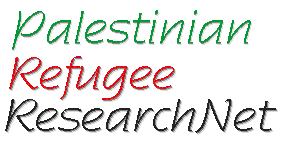A Stocktaking Conference on Palestinian Refugee Research
11h00-12h30
Tuesday, 9 December 1997Discussion Session: Repatriation and Absorption The "absorptive capacity" of the West Bank and Gaza was a central issue of discussion in this session. One participant noted that the Palestinian Authority is not currently in a position to absorb large numbers of returning refugees effectively, as was demonstrated in the problems incurred by the absorption of approximately 50,000 PA employees. The participant then raised the following points: What is the institutional capacity of the PA to deal with repatriation and absorption? What are the lessons to be learned from this limited repatriation regarding the possible future absorption of a population potentially numbering in the hundreds of thousands? Others noted that the uncertainty of the absorption process, in which the numbers of returning refugees vary widely, hinders research. The particular needs of refugee women were highlighted in this regard, and one discussant discussant emphasized the need to examine issues of health, education, shelter and training in relation to refugee women.
One participant noted how the Palestinian economy is constantly shackled by closures, and how they continue to stifle the economy. The discussant contended that the establishment of property rights is a necessary condition for the emergence of a viable Palestinian economy, and argued that the agrarian bases of the Palestinian economy must be reconstituted. Palestinians need to reclaim their natural economic bases from which they could launch new economic initiatives. This, however, should occur with the parallel development of the non-agrarian economic sectors. Since they do not require immense resource bases, one discussant mentioned the potential for the development of high-tech, cottage industries in the Palestinian territories. What is needed, then, is a renumerative infrastructure that can absorb and employ large numbers of people, and give them a stake in their economy. Other participants emphasised the need to reestablish the Palestinians' links with the economies of Arab states alongside the economy of Israel. Citing some European examples (Ireland and Portugal), one participant remarked that Palestinians should not fear the size of the Israeli economy, but instead should fear the predatory nature of Zionism (unless the latter is changing). This perspective was challenged by other participants who advanced examples in other regions of the world where larger and more viable economies swallowed up the smaller and traditionally-based economies of their weaker neighbours.
Some participants suggested that Israel's experience with absorbing large numbers of Russian Jews (in addition to significant waves of earlier immigrant communities) could serve as an example to explore to estimate the needs and difficulties of large-scale absorption. Others added that compensation for refugees should only be directed towards housing projects, and that more studies are needed to examine the number of refugees who might relocate within the Palestinian territories, particularly those who will leave Gaza and reside in the West Bank.
Given the Israeli fears concerning the impact of repatriation on their own country, some participants called for clearer definitions of the objectives and demands of the State of Israel: How does Israel define its security, identity and sovereignty? What are the real fears of the Israeli state? And what does the Arabs' acceptance and the existence of a Jewish state mean for Israelis? Finally, some participants noted that the security implications of repatriation and absorption cannot be limited to Israel and Palestine, but should also be expanded to include the security, economic and political concerns of neighbouring countries, particularly Jordan.
Finally, some felt that the issue of "absorptive capacity" was overemphasized: the return of most refugees was likely to be self-regulating, depending on the availability of employment and investment opportunities in the territories. Only refugees facing significant "push" factors (notably refugees from Lebanon) where likely to return to a Palestinian state in the absence of suitable economic conditions.
The PRRN/IDRC compensation workshop was funded by IDRC and the Canadian International Development Agency thrrough the Expert and Advisory Services Fund. PRRN is a project of the Interuniversity Consortium for Arab Studies (Montréal).Last modified 15/12/97. Rex Brynen/info@prrn.org


